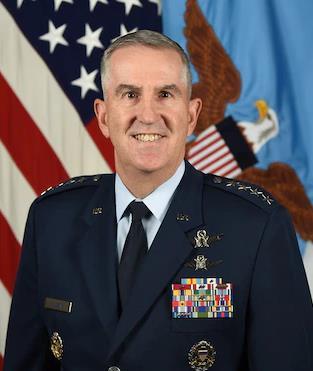John E. Hyten, vice chairman of the US Joint Chiefs of Staff, said in a think tank dialogue in Washington a few days ago that the US side is very clear that China is a "threat that is pressing forward step by step", and although there are differences between the two sides, there is a basic common goal, that is, to never go to war with the other side.
China News Service reported that Haydn made the above remarks at an online dialogue held at the Brookings Institution on the 13th. Speaking about the U.S.-China relationship, he said his only concern at the moment is that the two sides will not communicate much. "It's important that the two heads of state have communicated twice this year, but I hope this dialogue can also be extended to the middle level."

Haydn is an Air Force general who has served as vice chairman of the U.S. Joint Chiefs of Staff since November 2019. He is expected to step down by the end of the year.
In his dialogue, Haydn recalled that 2018 was a turning point in the U.S. Defense Strategy: from a 15-year-old "capability-based orientation" to a "threat-based orientation." The United States began to respond to external challenges in a "2+3" model, with China and Russia as "pacingthreat", plus threats from Iran, North Korea and violent extremism.
He pointed out that the US side is very clear that whether in the short or long term, China is a threat that must be paid attention to. From the perspective of joint combat capability, the United States is the first to consider dealing with China, but it is not underestimating the threat from Russia, and this year the United States will also include a strategic response to Russia.
Regarding the possibility of military conflict between future major powers, Haydn mentioned that the Thucydides Trap should be vigilant, and he also pointed out that the United States and the Soviet Union experienced serious confrontation after World War II, but there was no large-scale direct military conflict. "Because both sides have always maintained strategic deterrence and never crossed the line."
"When looking at great power relations, our goal should be to never go to war with China, never to go to war with Russia." Haydn went on to say that because that day is terrible for the earth and all nations, it will destroy the world, destroy the world economy.
Haydn argues that China is a very different competitor than Russia because of the sheer size of its economy and the interests of U.S. allies and partners. Despite the different structures of competition, the basic thinking of the United States in dealing with China and Russia is the same, that is, to maintain military deterrence and engage at diplomatic, economic and other levels.
Haydn pointed out that "sitting on the sidelines and not talking to each other will not help the United States develop better relations with China." The only thing I'm worried about now is that the two sides don't communicate much. ”
On the issue of strategic stability, Haydn believes that the United States and China need to sit down and talk at the political, diplomatic, and military levels, and although the two sides have differences, they have a basic common goal, that is, never go to war with each other. (End)